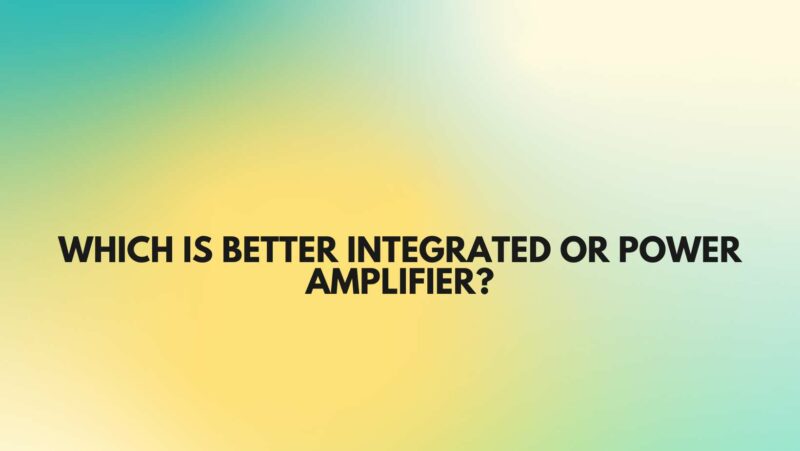When building or upgrading a high-quality audio system, one of the key decisions you’ll face is whether to use an integrated amplifier or a power amplifier. Both types of amplifiers have their advantages and are suitable for different scenarios, so it’s essential to understand their differences and capabilities. In this comprehensive article, we’ll delve into the features, strengths, and considerations of integrated amplifiers and power amplifiers to help you make an informed decision.
Integrated Amplifier
An integrated amplifier combines two critical components of an audio system: the preamplifier and the power amplifier. Here’s a closer look at the integrated amplifier:
- Simplicity and Space Efficiency: Integrated amplifiers are compact and space-efficient because they eliminate the need for separate preamp and power amp units. This makes them an excellent choice for smaller setups and areas with limited space.
- All-in-One Solution: Integrated amplifiers are user-friendly and often include additional features like built-in DACs (Digital-to-Analog Converters), phono stages for turntables, and multiple input options. They are designed to simplify your audio setup.
- Cost-Efficient: When compared to buying separate preamp and power amp components of similar quality, integrated amplifiers tend to be more cost-effective, making them an attractive option for budget-conscious audio enthusiasts.
- Versatility: Integrated amplifiers come in various power ratings, making them suitable for a wide range of speakers, from bookshelf to floor-standing models. They are versatile and can drive most speakers effectively.
- Sound Quality: High-quality integrated amplifiers can deliver excellent sound performance, especially in mid-range and entry-level setups. However, the sound quality may not match that of high-end power amplifiers.
Power Amplifier
A power amplifier, often referred to as a “power amp,” is a dedicated component designed solely for amplifying audio signals. Here are some key aspects of power amplifiers:
- Specialized Amplification: Power amplifiers are designed for one purpose: amplifying audio signals. This specialization often results in superior amplification capabilities compared to integrated amplifiers.
- Modularity: Power amplifiers offer modularity, allowing you to customize your audio system by choosing separate preamplifiers and power amplifiers from different manufacturers to achieve your desired sound signature.
- Power Output: Power amplifiers typically deliver higher power output per channel compared to integrated amplifiers. This makes them well-suited for driving demanding or power-hungry speakers, as well as larger home theater setups.
- Sound Quality: High-end power amplifiers are renowned for their exceptional sound quality, delivering precise and transparent amplification with minimal coloration or distortion.
- Specialized Features: While power amplifiers focus on amplification, they lack the additional features found in integrated amplifiers, such as DACs and built-in phono stages. Users may need to purchase separate components to fulfill these functions.
Making the Right Choice
Choosing between an integrated amplifier and a power amplifier depends on your specific needs and preferences:
- Space and Simplicity: If you have limited space or prefer an all-in-one solution with convenience features, an integrated amplifier may be the better choice.
- Sound Quality: If uncompromising sound quality is your top priority and you have the budget for it, a high-quality power amplifier paired with a dedicated preamp can provide superior audio performance.
- Customization: If you enjoy the flexibility of customizing your audio system or plan to expand it gradually, a power amplifier may be the way to go.
- Speaker Compatibility: Consider the power requirements of your speakers. Power amplifiers are better suited for driving demanding speakers, while integrated amplifiers work well with a wide range of speakers.
- Budget: Your budget plays a significant role in your decision. Integrated amplifiers are generally more budget-friendly, while high-end power amplifiers can be a substantial investment.
In conclusion, the choice between an integrated amplifier and a power amplifier ultimately depends on your specific requirements, budget, and the level of audio quality you seek. Both types of amplifiers have their merits, and there is no one-size-fits-all answer. Carefully assess your needs and preferences to determine which amplifier type will best complement your audio system and enhance your listening experience.

